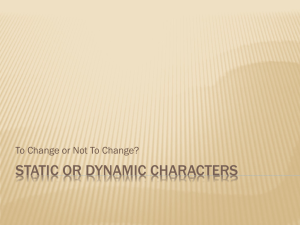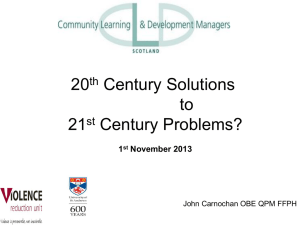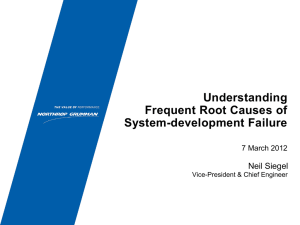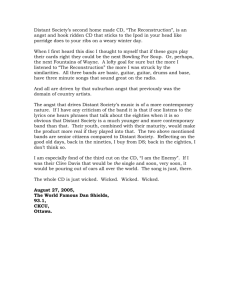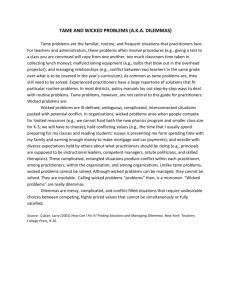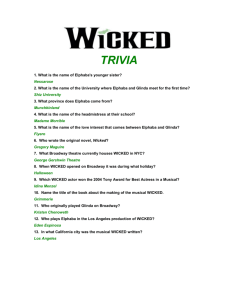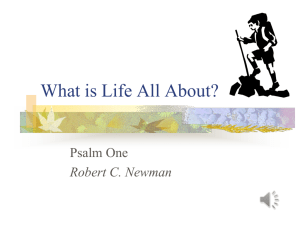SAVE THE DATE: October 26th & 27th, 2013 Wicked Problems in
advertisement
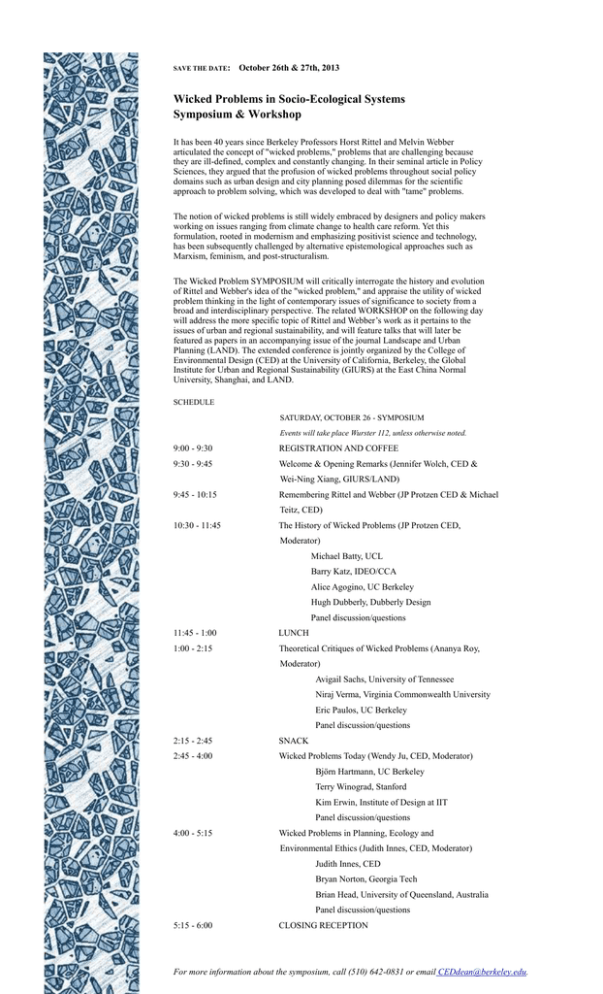
SAVE THE DATE: October 26th & 27th, 2013 Wicked Problems in Socio-Ecological Systems Symposium & Workshop It has been 40 years since Berkeley Professors Horst Rittel and Melvin Webber articulated the concept of "wicked problems," problems that are challenging because they are ill-defined, complex and constantly changing. In their seminal article in Policy Sciences, they argued that the profusion of wicked problems throughout social policy domains such as urban design and city planning posed dilemmas for the scientific approach to problem solving, which was developed to deal with "tame" problems. The notion of wicked problems is still widely embraced by designers and policy makers working on issues ranging from climate change to health care reform. Yet this formulation, rooted in modernism and emphasizing positivist science and technology, has been subsequently challenged by alternative epistemological approaches such as Marxism, feminism, and post-structuralism. The Wicked Problem SYMPOSIUM will critically interrogate the history and evolution of Rittel and Webber's idea of the "wicked problem," and appraise the utility of wicked problem thinking in the light of contemporary issues of significance to society from a broad and interdisciplinary perspective. The related WORKSHOP on the following day will address the more specific topic of Rittel and Webber’s work as it pertains to the issues of urban and regional sustainability, and will feature talks that will later be featured as papers in an accompanying issue of the journal Landscape and Urban Planning (LAND). The extended conference is jointly organized by the College of Environmental Design (CED) at the University of California, Berkeley, the Global Institute for Urban and Regional Sustainability (GIURS) at the East China Normal University, Shanghai, and LAND. SCHEDULE SATURDAY, OCTOBER 26 - SYMPOSIUM Events will take place Wurster 112, unless otherwise noted. 9:00 - 9:30 REGISTRATION AND COFFEE 9:30 - 9:45 Welcome & Opening Remarks (Jennifer Wolch, CED & Wei-Ning Xiang, GIURS/LAND) 9:45 - 10:15 Remembering Rittel and Webber (JP Protzen CED & Michael 10:30 - 11:45 The History of Wicked Problems (JP Protzen CED, Teitz, CED) Moderator) Michael Batty, UCL Barry Katz, IDEO/CCA Alice Agogino, UC Berkeley Hugh Dubberly, Dubberly Design Panel discussion/questions 11:45 - 1:00 LUNCH 1:00 - 2:15 Theoretical Critiques of Wicked Problems (Ananya Roy, Moderator) Avigail Sachs, University of Tennessee Niraj Verma, Virginia Commonwealth University Eric Paulos, UC Berkeley Panel discussion/questions 2:15 - 2:45 SNACK 2:45 - 4:00 Wicked Problems Today (Wendy Ju, CED, Moderator) Björn Hartmann, UC Berkeley Terry Winograd, Stanford Kim Erwin, Institute of Design at IIT Panel discussion/questions 4:00 - 5:15 Wicked Problems in Planning, Ecology and Environmental Ethics (Judith Innes, CED, Moderator) Judith Innes, CED Bryan Norton, Georgia Tech Brian Head, University of Queensland, Australia Panel discussion/questions 5:15 - 6:00 CLOSING RECEPTION For more information about the symposium, call (510) 642-0831 or email CEDdean@berkeley.edu. 8:00 - 10:00 SUNDAY, OCTOBER 27 - WORKSHOP Paper presentations: The adaptive, participatory, and transdisciplinary (APT) approach to working with wicked problems: empirical studies and theoretical explorations Wicked games of urban planning: how deliberative practices can help us create a collaborative playing field? Harri Raisio, Juha Lindell, Niklas Lundstrom, Pirkko Vartiainen, University of Vaasa, Finland Design experiments - a method for working with wicked problems, Torben Dam, Ole Fryd, Jan Støvring, and Antje Backhaus, University of Melbourne, Australia Precedents and wicked problems, Ole Fryd and Liao Kuei-Hsien, University of Melbourne, Australia; National University of Singapore, Singapore A social-ecological approach to assessing linkages between ecosystem services, livelihoods, and environmental governance in the Kagera Basin in Eastern Rwanda, Ahmed Khan, Hongmei Li, Linxiu Zhang, Xiubo Yu, Erasme Mbanzamihigo, Gisele Umuhumuza, Thierry Nhoza, United Nations Environment ProgramInternational Ecosystem Management Partnership, Beijing, China; Rwanda Environment Management Authority, Rwanda Natural Resources AuthoritKigali, Rwanda Conceptualizing creative adaptation to rural shrinkage, Anne Tietjen and Gertrud Jørgensen, University of Copenhagen, Denmark Eco Area Ratio (EAR) as a wicked problem: An ecological planning tool to “tame” the problem of urban densification in the case of Taipei, Perry P. J. Yang, Georgia Institute of Technology, USA 10:00 - 12:00 Paper presentations: The adaptive, participatory, and transdisciplinary (APT) approach to working with wicked problems: urban and regional sustainability Managing wicked natural resource problems: The collaborative challenge at regional scales, Brian Head, The University of Queensland, Australia An inclusive planning research on avoiding NIMBY risks of urban facilities at all stages basing on game relationship of multiple interests groups—A case study of public participation in urban regeneration of Diantou Historical District, Changting, Fujian, Xiang Zhang;Jian-gang Xu; Yang Ju; Fei Zhang, Nanjing University, China Operationalizing wicked problem solving to create desirable futures: the design agenda, Gavin Melles, Mattias Arvola, Stefan Holmlid, Swinburne University, Australia; Linköping University, Sweden The wicked nature of environmental and social distress in the Niger delta: informing public discourse with political ecology, Charisma Acey, University of California, Berkeley, USA 12:00 - 1:00 LUNCH 1:00 - 2:45 Paper presentations: Exploring wickedness through the lens of epistemological, methodological, and ethical significance: Awareness, acceptance, and adaptation New tools for deep-rooted problems: Using Complex Systems to decode wicked Problems, Moira Zellner and Scott D. Campbell, University of Illinois at Chicago, USA; University of Michigan, USA Doubling down: The wicked problem of forming transdisciplinary teams to address wicked problems in socio- ecological systems, Patricia E. Norris, Michael O’Rourke, Alex S. Mayer, Kathleen E. Halvorsen, Michigan State University, USA; Michigan Technological University, USA The nested, wicked air- conditioning solution, Larissa Larsen, Nick Rajkovich, Marie O’Neill, Carina Gronlund, University of Michigan, USA Meta-decision modeling of wicked landscape design problems: Resolving conservation versus development value conflicts in Tanzanian, Vietnamese and Peruvian socio-ecological systems, Asim Zia, University of Vermont, USA For more information about the workshop, please contact Ms Ying Chen at ychen@des.ecnu.edu.cn. Artwork courtesy of Patrick Hoesly under the Creative Commons Attribution license. SUNDAY, OCTOBER 27 - WORKSHOP Wickedness and regulation: A case study of off-highway vehicle use, Brian Muller, University of Colorado, Boulder, USA Mapping out of “the messes”: Public participatory mapping and cumulative environmental health impacts assessment, Ganlin Huang and Jonathan K. London, Beijing Normal University, China; UC Davis Center for Regional Change, CA 3:00 - 5:00 GROUP DISCUSSIONS AND WRAP-UP For more information about the workshop, please contact Ms Ying Chen at ychen@des.ecnu.edu.cn. Artwork courtesy of Patrick Hoesly under the Creative Commons Attribution license.

